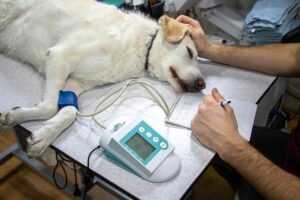
Becoming a veterinary doctor is no easy task. It requires years of schooling and training, not to mention a passion for animals and a dedication to helping them heal. But it is an incredibly rewarding career, one that allows you to work closely with animals and help them overcome illness and injury. If you’re thinking of becoming a veterinary doctor, here’s what you need to know.
Complete a bachelor’s degree
In order to become a veterinary doctor, you’ll need to complete a four-year bachelor’s degree at an accredited university. During your undergraduate studies, you’ll take classes in biology, chemistry, physics, and other sciences. You’ll also likely have the opportunity to shadow or work with a veterinarian, which can give you valuable experience in the field.
Complete a Doctor of Veterinary Medicine (DVM) program
After completing your undergraduate studies, you’ll need to attend a four-year DVM program at an accredited university. During your time in veterinary school, you’ll take classes in animal anatomy and physiology, pharmacology, microbiology, and other subjects. You’ll also gain hands-on experience through clinical rotations, working with animals in a variety of settings.
Pass the state licensing exam
In order to practice veterinary medicine, you must obtain a license from your state’s Board of Veterinary Examiners. To do so, you’ll need to pass the North American Veterinary Licensing Examination (NAVLE). The NAVLE is a two-day, 16-hour exam that tests your knowledge of veterinary medicine.
Find a job
Once you’ve obtained your license, you can begin practicing veterinary medicine. You can work in private practice, as part of a research team, or in another setting. You may also choose to specialize in a particular area of veterinary medicine, such as surgery or dentistry.
Stay up to date on new developments
The field of veterinary medicine is constantly changing, so it’s important to stay up to date on new developments. You can do this by reading professional journals, attending conferences, and taking continuing education courses.
Consider pursuing a specialty
If you’re interested in a particular area of veterinary medicine, you may want to consider pursuing a residency or fellowship in that specialty. This can be a great way to further your career and broaden your skillset.
Study hard in high school to get the required credits
In order to become a veterinary doctor, you need to study hard in high school and get the required credits. You should also consider pursuing a degree in veterinary medicine from an accredited college or university.
Get a bachelor’s degree in Science or Animal Science from a 4-year university
In order to become a veterinary doctor, you need to have a bachelor’s degree in Science or Animal Science from a 4-year university. After completing your undergraduate degree, you then need to attend a veterinary school and complete a Doctor of Veterinary Medicine (DVM) program.
Get experience by working at an animal hospital for 3-5 years
One way to become a veterinary doctor is to get experience by working at an animal hospital for 3-5 years. This will give you the opportunity to learn about different animals, as well as how to treat them. You’ll also be able to develop your skills in diagnosing and treating illnesses.
Pass the national board exams that allow you to practice as a veterinarian
Once you have completed your veterinary education, you will need to pass the national board exams in order to become a licensed veterinarian. The exams will test your knowledge of veterinary medicine and animal health.
Finally, pass the state licensing exam to practice veterinary medicine
The steps to becoming a licensed veterinarian vary by state, but all states require successful completion of the North American Veterinary Licensing Examination (NAVLE). Some states may also have additional requirements, such as passing an ethics exam or completing a certain amount of continuing education credits. Once you have met all the requirements for licensure in your state, you will be able to officially begin practicing veterinary medicine!
Conclusion
Veterinary medicine is a challenging, but rewarding field. It’s not for everyone, but if you have the passion and drive to help animals, then the veterinary school may be the right choice for you. We hope this article has helped you better understand what it takes to become a veterinarian and the many paths that are available to you. Thank you for reading!







